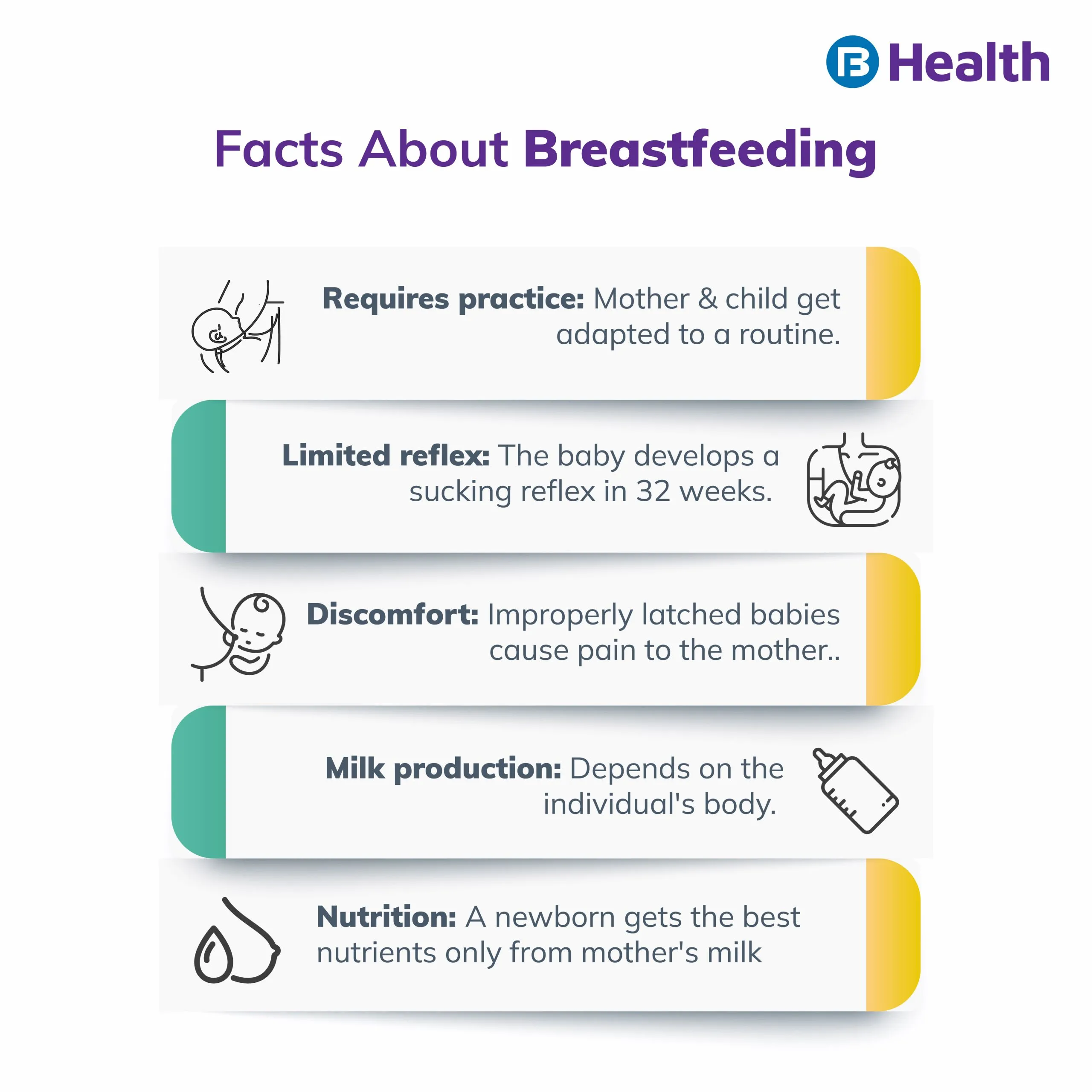General Health | 8 min read
World Breastfeeding Week: Guide for Child's Proper Care
Medically reviewed by
Table of Content
Synopsis
Myths about breastfeeding complicate a mother who has recently been through labor and delivery. Some myths even make her doubt herself and her child. Being aware of the facts helps in giving proper care to your child.
Key Takeaways
- To make your infant healthy and support its proper growth, you need to be aware of important facts about breastfeeding
- It is important for a baby's growth that it must only be supplied with its mother's milk unless otherwise
- Mothers should not trust any statement regarding breastfeeding unless it has been scientifically proven
After delivery, a mother enters a completely new phase of life where they have to take care of two lives at once, and both are delicate in that phase. The changes in her body bring ahead of her a lot of challenges and difficulties that are beyond any verbal description. This world breastfeeding week 2022 knows all the truths about breastfeeding are a mystery to many. Here we answer all your questions, along with putting an end to all the myths in the air about the process.
This world breastfeeding week, let's make our mission to end the myths with the facts and make it a successful breastfeeding awareness week. The following blog dispels the most famous myths women come across when they nurse their babies. Taking care of these facts breastfeeding benefits a mother's health as well.
Myths and Facts About Breastfeeding:
There are some famous myths about women after giving birth to a baby. Knowing the facts can help you take better care of your child and also help you spread awareness among your peers.
1. Within the first few days, you'll realize that you can successfully breastfeed. This shouldn't be so challenging.
Fact: It takes practice to breastfeed, and the early days can sometimes be difficult. It takes time to determine what works best for each mom and baby team because everyone is different. During the first few days or weeks, you and your baby are getting to know one another.
You'll quickly become at ease and develop a rhythm if you approach it as practice. You can learn from your friends who are your good wishes and learn from them, or you can reach out to local communities and support programs as well.
2. Babies have a natural breastfeeding ability.
Fact: Babies are born with some reflexes such that when a baby's mouth roof is touched, or this area around his mouth is stimulated, the baby will start sucking, which aids in nursing or bottle-feeding. The rooting reflex causes the baby to turn its head in the direction of any mouth or cheek strokes. However, your baby won't develop this reflex for nearly 32 weeks after birth.
Although your baby is born with some instincts, breastfeeding success is not guaranteed by them. Both the baby and the mother need to learn and practice breastfeeding. If you or your baby is having trouble feeding, then do not be discouraged because these effects on your baby are minor and may have been caused by the medications given to support the labor and only last a short time.

3. In the initial days, breastfeeding will hurt.
Fact: At the beginning of a nursing session, when babies latch on properly, some mothers experience a brief period of discomfort. The discomfort should then subside. While your baby feeds, you might feel a slight tug on your breasts, but it won't hurt you. Your nipples may become sensitive when breastfeeding due to increased hormone levels after delivery. This nipple sensitivity is normal.
When babies are improperly latched on, each time they suck, it may hurt or feel like a pinch. The ring around the nipple should be mostly in your infant's mouth. Pain in the nipples is abnormal. A lactation consultant should be consulted to determine the cause if it does occur. It can be lessened with the help of a lactation professional.
Some other causes of breast pain are plugged milk ducts, inflammation of the breast, and oral thrush infection in a baby's mouth.
4. In the initial days, you won't be able to produce enough breast milk, so you should drink more milk.
Fact: When determining how much to consume, drink just enough milk to quench your thirst. New mothers frequently experience increased thirst when nursing, especially if the child is a newborn. Lactating mothers require between 2 and 3 liters of fluid per day, which equals about 10 to 12 cups. The only way to increase milk production is by letting the baby empty the breast while nursing, which further stimulates the milk ducts to produce more milk. Drinking more milk does not affect your ability to produce more milk.
5. You can't both breastfeed and feed the baby bottle milk. And formula milk is similar to breast milk.
Fact: This is sometimes called "mixed" or "combination feeding." You may be required to practice combination feeding if you have to be away from your baby. But remember that the formula functions more like a medicine than a food. There are lots of benefits to breastfeeding your baby. It's not necessary to stop breastfeeding if you introduce formula to your baby's diet.
To ascertain how much breastmilk and formula your developing baby will require in the initial months, consult your pediatrician or a lactation consultant. Breastfed babies have been shown to have lower risks for several diseases that can stunt their growth as they age.

6. Sleeping infants shouldn't be disturbed for feedings; instead, you should let them get the rest they need.
Fact: It depends on the baby's age and health whether you should wake a sleeping newborn for feeding. For the majority of newborns, health falls in the initial days following birth. You should feed your newborn frequently until they regain the lost weight, which should happen within one to two weeks of birth. This may require you to occasionally wake your infant to feed them, especially if they regularly sleep for longer than four hours.
Longer intervals between feedings and allowing a baby to continue sleeping may cause them to become more sleepy, which can develop into a new problem. Mothers must wake their newborns in the early days after birth, give them nutrition, and establish a feeding schedule.
7. You can't breastfeed if you smoke.
Fact: Breast milk remains the ideal food for a newborn baby even if the mother does not stop smoking because there are no valid studies or evidence that breastfeeding from a mother who smokes has negative effects on the infant. Smoking is not recommended for lactating women. There is a chance that a woman who smokes will produce milk with less iodine.
The baby's mother or anyone else should avoid smoking around your child. After smoking outside, keep your child's distance from your coat or other outerwear. Additionally, even with the windows open, avoid smoking in the car when you have a baby.
8. If your breasts and nipples are small in size and shape, you will have trouble nursing.
Fact: Even though your breasts will probably get bigger before and during breastfeeding, milk production is unaffected by breast size. A mother with small breasts may produce an equal amount of milk as a mother with large breasts. The amount of milk you naturally produce increases as your baby feeds more frequently; generally, the more your baby feeds, the more milk you naturally produce.
The size and shape of the nipple may matter for mothers who have trouble latching on and dealing with engorgement. Babies may have trouble latching onto nipples that are large, flat, or inverted. But don't worry. You and your child will eventually become accustomed to it and adapt to it.
9. There will be an equal amount of milk in each breast.
Fact: Different milk duct sizes or those that have been harmed by prior surgery or injury are just a few of the causes of uneven milk supply. Your letdown during the feeding process can also be a factor. Your baby might pull away from your breast if you let down abruptly. The infant then decides which side to take, and a less forceful one might leave your child hungry. To control the letdown, your baby may latch differently due to it.
Your considerations about low milk production shouldn't stop you from feeding your baby breast milk because that is important for your child. There are many causes of low milk production, including long, stressful labor, cesarean sections, smoking, and hormonal imbalances.
10. Breastfeeding should be stopped when your baby gets teeth.
Fact: Although some babies are born with one or more teeth, and in some cases, teeth don't appear until the child is almost a year old, your baby's first tooth will likely appear after six months. When a mother notices a tooth, she frequently decides it's time to stop breastfeeding. They are usually concerned that she will be bitten. Yet many babies with teeth never bite when breastfeeding.
Once your infant has finished nursing, take her away from the breast. If your baby bites, then remain calm. Carefully unlatch and gently object. A strong response might amuse and pique her interest enough to repeat the action.
The solution to myths is to know the facts and circulate these facts to more and more people. Just as we make everyone aware of health on world mosquito day or celebrate mother's day, let's create a successful world breastfeeding week in 2022. Breastfeeding a baby is a mystery for many people, and without proper knowledge, a mother may end up taking steps that may harm herself or her baby. For more information on myths about breastfeeding, you can consult online on Bajaj Finserv Health with the best lactation professionals. They will guide you to the healthy upbringing of your baby.
References
Disclaimer
Please note that this article is solely meant for informational purposes and Bajaj Finserv Health Limited (“BFHL”) does not shoulder any responsibility of the views/advice/information expressed/given by the writer/reviewer/originator. This article should not be considered as a substitute for any medical advice, diagnosis or treatment. Always consult with your trusted physician/qualified healthcare professional to evaluate your medical condition. The above article has been reviewed by a qualified doctor and BFHL is not responsible for any damages for any information or services provided by any third party.





